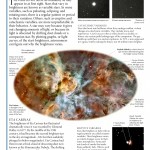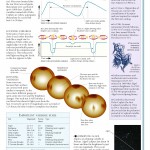These maps show stars visible all year in the northern and southern hemispheres. They also mark the position of interesting objects, such as star clusters and galaxies. To see what is visible, face north in the northern hemisphere and south in the southern hemisphere.
The Variable stars contains pulsating variables, the eclipsing variables and the rotating variables. Toward the end of their lives, stars often pulsate, varying in brightness, temperature and size. Some pairs of stars are so close to each other that they look like a single star. In addition, if their orbits are angled edge-on to the Earth, each start periodically passes in front of its companion. Some stars vary because their surfaces are covered with spots similar to sunspots.
Related posts:
In this era of 50 years of Manned Space Flight, USA stands at the top of the list in the Nations with the most Astronauts who have been sent to the space. Russia stands at the third position with France and Germany following it. The farthest Manned Missions from Earth is Apollo 13 which has travelled around 401,056 km in 1970. Next farthest is Apollo 8 followed by Gemini 11 and Gemini 10. Yur...
The Space Capsule has been developed for NASA to service the International space station; the reusable Dragon capsule is lofted into orbit by Spacex’s Falcon 9 rocket. While the first flights are to carry cargo only, the capsule was designed to be capable of carrying up to seven astronauts.
The Pioneer plaques are a couple of gold-anodized aluminum plaques which were put ready the 1972 Pioneer 10 and 1973 Pioneer 11 space apparatus, offering a pictorial inform, on the off chance that either Pioneer 10 or 11 is captured by extraterrestrial existence. The plaques demonstrate the bare figures of a human male and female as well as a few images that are composed to give informative da...
Stellar advancement is the methodology by which a star experiences an arrangement of radical updates around its lifetime. Hinging on the mass of the star, this lifetime extends from just a few million years for the most gigantic to trillions of years for the slightest huge, which is impressively longer than the time period characterized by the universe. All stars are born from falling mists of...
The actual metric enlargement of area may be the improve with the distance in among two remote elements of the actual world with time. It is really an intrinsic expansion — that's, it is defined by the family member divorce associated with areas of the actual universe and never through action “outward" into preexisting area since, as an example, a surge associated with make a difference. The p...
NASA’s Constellation program comprises a set of launch boosters, space vehicles and support modules that together will place humans on the moon by 2020. Plans call for astronauts to stay on the lunar surface for periods ranging from four days to more than six months.
Most astronomers believe that all the members of the solar system, from the giant Sun to the smallest asteroid, were born out of a vast, spinning cloud of gas and dust – the solar nebula. The process began 5 billion years ago with the formation of the Sun. The planets and other objects formed from unused material. When the solar system was nearly complete, 500 million years later, just 0....
In 1659 Dutch astronomer Christian Huygens, using an early telescope, drew the first sketch of a surface feature on Mars, a dark patch know today as Syrtis Major. More than three centuries later the mars global Surveyor is charting the entire planet. Data beamed from the orbiting surveyor have rendered a detailed and true-color map of this seemingly most Earthlike of planets.
Although the moon is much smaller than the Earth, it still has an influence on its bigger companion. Just as the Earth’s gravity pulls on the Moon, the gravity of the Moon pulls on the Earth, stretching it into a slight oval. This distortion barely affects the solid landmasses, but it makes the oceans bulge on either side of the planet, producing the tides on either side of the planet. ...
Original person has an ambiguous temporal experience inside the box and becomes his double. Original person on undisturbed timeline decides to time- travel. He activates a time – delay device and leaves the area to avoid clashing with his double.
The rings of Saturn are the most far reaching planetary ring framework of any planet in the Earth's planetary group. They comprise of endless minor particles, running in size from micrometres to metres,that circle about Saturn. The ring particles are made just about truly of water ice, with a follow segment of rough material. There is still no agreement as to their mechanism of creation; certa...
A planetary framework is a situated of gravitationally bound non-stellar questions in circle around a star or star framework. Ordinarily vocalizing, planetary frameworks portray frameworks with one or more planets, admitting that such frameworks may additionally comprise of figures for example predominate planets, space rocks, expected satellites, meteoroids, comets and planetesimals and addit...
The positions of planets at the time of your birth are determined first. This forms the birth data. Your birth data is then compared to the positions of planets at various stages in life, to predict your future and major events that could happen in your life.
Astronomers expect spectacular displays of meteor showers over North America and Europe on Wednesday and Thursday as the Earth crosses the path of Comet Swift-Tuttle’s Orbit. The comet you see from your eye is actually the icy dust from the comet burning off as it nears our Sun.
As we cannot yet travel outside the solar system, we have to learn as much as we can about the stars by studying them at a distance. Astronomers can tell the brightness, color, and temperature of a star by analyzing the light it gives out. By splitting starlight into its constituent colors, they can find out what the stars are made of and how fast they are moving. Stars are so far awa...
This diagram shows how astronauts live on the space station. Everything is attempted to be recovered on the space station. The urine that astronauts dispense from their bodies is reused as water. Waste water is then reused to create oxygen. Co2 is removed through overboard venting. It's amazing how much everything is reused on board.
In winter, constellations and stars are the main attractions because the milky way is faint. These include the brightest constellation, Orion, and the brightest star. Most of the visible stars are in our own local arm of the galaxy, which also contains several star nurseries that can be seen in close – up such as the Orion Nebula.
Majority of the Apollo Lunar Components are more sensitive and they have to be treated very carefully. It contains components like Rendezvous radar antenna, environmental Control System module, Crew Compartment. A crewman handles all these components with utmost care. Reaction Control thruster assembly, ascent propulsion, Red Docking Light, Egress Platform, Fuel tank, Descent Engine, Lunar Sur...



 Upload your infographic here and contribute to our community.
Upload your infographic here and contribute to our community. 
Leave a Reply